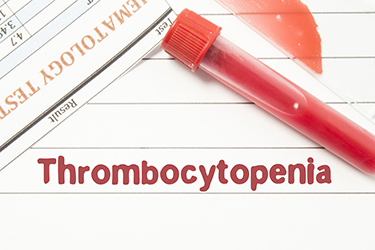Thrombocytopenia Treatment in Midland Park, NJ

If you seem to bleed longer and more intensely lately, and if headaches and fatigue are becoming more frequent, you may want to ask your doctor about getting a blood platelet test. Platelets (thrombocytes) are blood cells that enable blood to clot after a hemorrhaging (bleeding) injury. An abnormally low number of platelets in the blood is called thrombocytopenia. In mild cases, this condition may not cause symptoms, but in rare, severe cases, it may induce internal bleeding. To treat thrombocytopenia your doctor will need to address the underlying cause, such as an autoimmune disorder or a side effect of your medication. You can rule out, or diagnose and treat this condition in Midland Park, NJ. Call (201) 806-6099 or contact Dr. M.T. Shahab online to learn more!
Thrombocytopenia Symptoms
Bleeding—either internal or external—is the main symptom of thrombocytopenia. In mild cases, thrombocytopenia may show no symptoms (asymptomatic) and may only be detectable with a blood test. Symptoms of thrombocytopenia may include:
- Red or purple blotches in the skin (purpura)
- Small red or purple skin spots caused by broken capillaries (petechiae)
- Prolonged bleeding from minor cuts
- Nosebleeds
- Unusually heavy menstrual flow
- Blood in the urine (hematuria)
- Headaches
- Fatigue
- Yellowing of skin and eyes (jaundice )
In severe cases, thrombocytopenia may cause uncontrolled bleeding after an injury. This is a medical emergency - seek help immediately.
Thrombocytopenia Causes
Thrombocytopenia can be acquired or inherited. There are four main types of thrombocytopenia, and each type has multiple potential causes:
- Decreased platelet production
- Increased platelet destruction
- Medication-induced
- Other causes
Decreased Platelet Production
Many hereditary syndromes can cause decreased platelet production, including:
- Congenital amegakaryocytic thrombocytopenia, which causes bone marrow to produce too few platelets
- Thrombocytopenia absent radius syndrome, which causes insufficient platelet production
- Fanconi anemia, which impairs the production of all blood cells
- Bernard-Soulier syndrome, which causes deficiency of a protein important to platelet function
- May-Hegglin anomaly, which causes production of low numbers of oversized, misshapen platelets
- Grey platelet syndrome, which causes numerous platelet defects
- Wiskott-Aldrich syndrome, which causes the production of low numbers of undersized platelets
Other health conditions that may cause decreased platelet production can include:
- Dengue fever, a viral infection that affects the bone marrow
- Leukemia , lymphoma , aplastic anemia, and myelodysplastic syndrome, which all cause bone marrow dysfunction
- Leptospirosis, a bacterial disease that may affect the bone marrow or cause low platelet count due to widespread bleeding
Increased Platelet Destruction
Congenital immune conditions that cause platelet destruction include:
- Thrombotic thrombocytopenic purpura, or the formation of numerous microscopic blood clots that causes low platelet count and purple skin spots
- Hemolytic uremic syndrome, which causes low platelet count and anemia
- Paroxysmal nocturnal hemoglobinuria, in which the immune system destroys blood cells
- Antiphospholipid syndrome, in which the immune system destroys healthy blood proteins
- Systemic lupus erythromatosus, which is inflammation caused by the immune system attacking healthy tissue
- Post-transfusion purpura, or the destruction of platelets by an adverse reaction to a blood or platelet transfusion
- Neonatal alloimmune thrombocytopenia, caused when a pregnant woman and her fetus have different platelet types
Non-immune conditions that can result in platelet destruction include:
- Disseminated intravascular coagulation, or the formation of numerous microscopic blood clots
- Hypersplenism, or an enlarged spleen that destroys blood cells too quickly
- Gaucher's disease, a genetic disorder that can cause the spleen to kill platelets
- Zika virus infection, which causes the immune system to attack platelets
- Sepsis, which causes platelet death
Medication
Several medications can cause low platelet count by reducing platelet production in the bone marrow, including:
- Valproic acid and carbamazepine, which are anticonvulsants
- Chemotherapy drugs
- Interferon, a form of cancer immunotherapy
- Isotretinoin, an oral retinoid used to treat acne
- Proton pump inhibitors, which reduce stomach acid production
- Heparin, an anticoagulant
- Quinine, an antimalarial drug
- Sulfamethoxazole, rifampin, and vancomycin, which are antibiotics
- Acetominophen, a painkiller
- Chlorpropamide, which stimulates insulin release to treat diabetes
- Ranitidine, a heartburn medication
Other Causes
Causes of thrombocytopenia that do not fit into the above categories include:
- Snakebite venom, which often causes multiple bleeding problems
- Lyme disease, which causes low platelet count by poorly understood mechanisms
- Acute respiratory distress syndrome, during which platelets may become concentrated in the blood vessels in the lungs
- Thrombocytapharesis, the process of collecting platelets for transfusion, which can deplete platelets
Thrombocytopenia Diagnosis
Thrombocytopenia can be diagnosed with several blood tests:
- Complete blood count, which determines the number of cells—including platelets—in your blood
- Blood smear, which allows a healthcare provider to view your platelets under a microscope
- Bone marrow test, which may help a healthcare provider determine whether your blood is producing enough platelets
To determine whether or not you need a blood test for thrombocytopenia, your doctor may perform a physical examination to check for an enlarged spleen or signs of bleeding under your skin.
If a thrombocytopenia diagnosis is made, you may need a variety of other tests to determine the cause, such as antibody test for an immune disorder or a biopsy to test for leukemia or lymphoma.
Thrombocytopenia Treatment
Mild thrombocytopenia may not require treatment. If thrombocytopenia becomes severe or long-lasting (chronic), you may need to address the condition that's causing the low platelet count. Your healthcare provider may prescribe corticosteroids for an autoimmune condition or replace your current medication with one that does not have thrombocytopenia as a side effect. Other potential treatments may include:
- Blood or platelet transfusions
- Plasma exchange
- Surgery to remove spleen (in extreme cases)
Request Your Appointment Today!
If your blood doesn't seem to be clotting normally, you may want to discuss thrombocytopenia testing with your healthcare provider. If you have low platelets, treatment is available in Midland Park. To schedule an appointment with a hematologist, call (201) 806-6099 or contact Dr. M.T. Shahab online today!
Medwell Orthopedics & Functional Medicine for Men & Women
Address
33 Central AveMidland Park, NJ 07432
(201) 806-6099
www.BergenCountyDoctors.com
Hours
Mon:
8:00 am - 8:00 pm
Tue:
2:00 pm - 7:00 pm
Wed:
8:00 am - 6:30 pm
Thu:
8:00 am - 1:00 pm
Fri:
8:00 am - 6:30 pm
Sat:
9:00 am - 1:00 pm
Sun:
By Appointment Only


